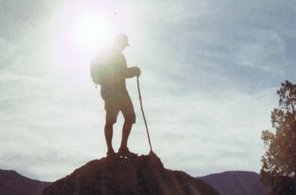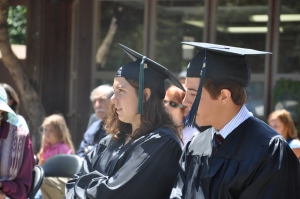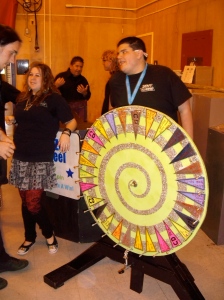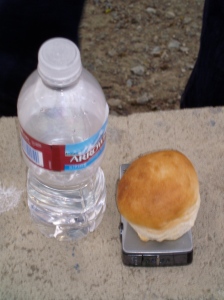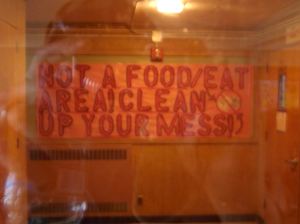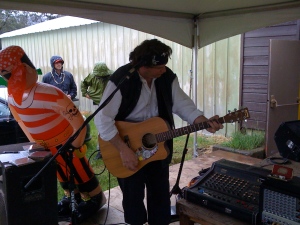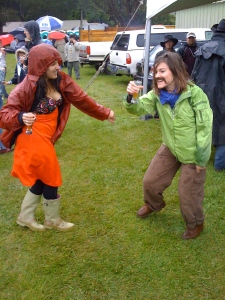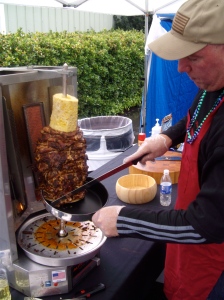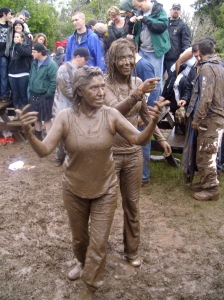“Dude, I think that you need a cat.”
Those fateful words were uttered in the middle of another sleep-deprived Colorado night back in the year of Ought-Four. My redheaded lady friend at the time – now my sweet wife – was the utterer. The ancient timber walls of the rancher’s cabin that I lived in were alive with mysterious activities. Every night, the dance of the deer mice began somewhere in the vicinity of the headboard of my double bed, then ran a hidden course that looped all the way around the small cabin in a loud circuit. Small shadows darted about the pine floors. Food supplies, both human and canine, were regularly attacked. The constant scurrying had my old dog Bear in a frenzy of frustrated patrols.
The last straw came when, lost in a pre-dawn codeine stupor while fighting the lingering Crud, I awoke to the tapping of a clammy nose upon my feverish cheek. Cracking one bloodshot eye, I made out the hazy image of a ragged-looking mouse sitting up on my chest. He was holding the keys to my truck in his outstretched hand. “We’re gonna take the Ford for a spin up to the Cardamone place. There’s a mouse party goin’ down up yonder…Cheese, milk, cereal by the barrel…the whole nine centimeters,” the rodent said nonchalantly. “Thought that you might want to know that you’ll probably be late for work today. We’ll be back around 11… Ish…” it added.
“Ohhh. OK. Thanks…I guess. But hey…can you put some fuel in the truck? I’m almost out,” I replied. My head was woozy. The room was spinning. “Sure, sure, bub. We’ll “put some fuel in it” the mouse retorted with a sarcastic wink and the flicking of his rubbery paws in the universal sign of mocked quotation.
When I emerged from my narcotic slumber it was past noon. I looked out of the window and saw that my truck was parked halfway into Miss Carolyn’s prized azaleas. I looked down at the kitchen floor and was not surprised by what I saw. At least a baker’s dozen mice were passed out haphazardly on the linoleum, smiles cast on their milk-stained faces, yellow curds clutched greedily in their awful paws. “Bear! Get em!” I shrieked. The half-Shepherd, half-Chow, half-human leapt into action from his nap at the foot of the bed. The mice all sat up slowly, watching his progress across the 10 feet that separated them with bemused looks, not unlike Monty Python’s French castle guards. Bear growled fiercely as he narrowed the gap, and was about to tear into the mess of them with a year’s worth of pent up, stolen-Alpo doggie fury when the entire stoned colony of mice bolted in every direction at once. All of them, that is, but one.
The Bear stood above him snarling like I had never seen him snarl before – well, other than every day the UPS man comes by that is. But rather than cower at the sight of the relatively enormous monster before it, the mouse produced a tiny white glove from beneath it, methodically straightened out each of its fingers, and then rudely slapped the menacing dog once each way across the nose in rapid succession before hopping off towards a large hole underneath the sink cabinets. Just before it vanished into its hole, the mouse looked back at the two of us, both frozen in stunned silence, and flipped us an exaggerated, arched back double bird, then wheeled and slipped into the darkness. We were still stilling there in frozen astonishment when we saw a creepy ribbed tail emerge backwards from the hole, followed by a hairy rat’s ass. Then, preceded by a discernibly gross, cheesy fart, and there before Jah Rastafari, Bear Anderson, and a shelve full of shocked-looking antique action figures, the Francophile mouse shat a row of shining black poo pebbles onto the kitchen floor. Prior to that moment, I did not think it possible for a dog to wince, but it became clear to me then by looking at the pained look on Bear’s face told me that it was indeed Time To Get A Cat.
Two weeks later, almost as if on cue, a mixed litter of black, white, and grey barn kittens were born in a loft of the ranch where I lived. My girlfriend (and now my wife) had by then moved into the 500 square foot cabin, along with her three beloved ferrets, and was insistent that we claim one of the litter when they were old enough to leave their mother, Muffin.
I had never owned a cat. Never really been around cats other than one that my roommates had in college – an orange tabby named Goat who mostly lived outside with the chickens and the couches. My parents had never had a cat, and I am fairly certain that their parents hadn’t either. I generally mocked those friends of mine that had cats as being soft. The concept was totally foreign to me. But Sharon had grown up with cats and after her own run-in’s with the mousey mafia that ruled our roost, I was assigned, literally, a tiny, bright-eyed white kitten with snappy black patches on its face and one paw and a long grey-stripped raccoon tail.
We brought him into the cabin and Sharon, her ferrets, Bear and I all watched in awe as this little furbearing rocket flew around our house, leaping from dresser to the bed, from the bed to the door sill, performing consistent acts of gravity defiance. Our neighbors Adrian and Susan came over to check on the brother of their two kittens, Pancho and Lefty. We all sat in a circle watching the kitten frolic, drinking Tullamore Dew scotch whiskey from the bottle, and pitching names for the thing. It was Adrian, a native North Carolinian like myself with deep roots across the south, who came up with the name that stuck: Cotton. I would later add an unofficial prefix to the name – Rotten.
Days turned into months and Cotton steadily grew from his initial miniscularity into a fine looking full sized cat. Within weeks of his arrival into our little cabin world, our mouse problem had ebbed into just an occasional brave (or stupid) loner who hadn’t heard the news: There was a new sheriff in town, and he wasn’t taking any prisoners. I have never seen Bear more happy. Finally we could all sleep in peace, except for the occasional sudden midnight flurry, usually followed by a contented sounding CRUNCH CRUNCH from somewhere in the kitchen area. One morning I awoke to find the cat in his customary place –lodged like a shiv, forming a perfect dividing line with the Bear dog between Sharon and I. I was stroking the soft fur on his head when my hand coursed over his face, where something tangibly out of place found my touch. Bleary eyed, I sat up and peered over at him. Sticking out of his smiling mouth was a tiny white glove. Cotton had found his true calling at a very young age. We should all be so lucky.
II.
Cotton lived what I imagine to be the most happy and fulfilling life a cat can hope for on the Shipp Ranch for several years prior to our 2005 move to the clean (but busy) streets of Carbondale, Colorado. In the winters, he curled up and lounged with us in the cozy cabins. When the snow melted enough that his paws would tolerate the frigidity of the earth, he booked it for the pasture fences, where he would stalk the rails in a low crouch, feeding on a veritable Arc of wildlife – field mice, rabbits, birds of a hundred feathers, lizards, snakes, and the occasional Formerly Sentient Being To Be Named Later.
Despite the anti-camouflage of his stark white coat and his daring do in a heavily hunted predatory zone, Cotton survived and thrived at ranch life. He outlasted his mother and the three of his litter mates that were kept on the ranch, all of whom were picked off by a particularly wily pack of coyotes, though he regularly came home with fresh scars that foretold of difficult battles with larger mammals.
The move to our new townhouse was a blessing for Sharon and myself. We finally had our own place, along with the room to spread out a bit that any co-habitative long-term cabin-dweller eventually yearns for. The “kids,” however, seemed to lose a little bounce in their new city lives. No longer free to roam wide pastures and open space, and confined to the house for fear of the many cars and trucks that buzzed our neighborhood, Cotton and Bear both whined and whimpered at the front and back doors of the house, often one at each, an achievement of stereophonic guilt.
Eventually, we relented. With his regular, mournful moan becoming intolerable, and after a few long man –to-cat talks, Cotton was given the run of Barber Drive. It was not an easy decision. The irony of the name Car-bon-dale was not lost on me. We knew the possibilities that his street walking might bring. In the end, we figured that with the ideal life that he had already led, he deserved a chance to go out (in this case, literally) on his own terms. Survival of the fittest, carpe meow, all ‘dat…
I was not surprised in the least that he took to the dangerous city streets as easily as he did to the predatorily hazardous ranch trails. He was the quickest cat I’ve ever known, with extra cat-like agility. Regularly I would be sitting on the back porch overlooking the hubbub of Hendrick Drive when I would see a white flash emerge from underneath a parked car, dash across the road comfortably ahead of oncoming traffic, and disappear under the cars and trucks parked across the way. And, ever evening, just like clockwork, when the wife or I would go out on the front stoop and clang a tuna can with a wooden spoon, here would come Cotton, just as dirty and bloody and happy as ever.
III.
It was three in the morning in Posen, Michigan when polite knuckles rapped on the door of Sharon’s childhood bedroom door. I was there to meet her parents and multitude of strapping, protective-looking siblings, and, if everything went well, to ask her father’s permission to marry his daughter. Bleary eyed from the late hour and the gallons of pilsner consumed earlier at the bonfire meet and greet, we heard the voice of Sharon’s mother, Rita. She sounded concerned, but ever so politely. “There is a girl on the phone for you Corby. I think that she speaks another language. She wants to talk to you,” she said. Her tone worried me. Her tone worried me. There are, after all, very few potential positive outcomes when a French woman calls your girlfriends parents house in the middle of the night of your engagement party asking for you.
Thanking my future mother-in-law, I took the call. “Zee cat, eez squieeeshed!” said the voice on the other line. I recognized it to be that of my TV station intern, Cecile, a Frenchwoman who was at our house watching the animals for us. “Zee cat! Eet eez squished…oh no I feel zo tereeebley!” she said again in a Franco lilt. “Eer. Talk to zee veterinarian,” she said sadly, pronouncing every syllable of “vegetarian” with utmost care.
The vet got on the phone and told us that Cotton had been ran over by a car. He said that Cecile had brought him in that night, but that he suspected the accident to have happened earlier, maybe a full day earlier. She had found him after hearing a low moan outside of our bedroom window – usually a sound only heard coming from Peeping Juan, the town pervert. “He doesn’t look good. He’s got a broken leg and pelvis. We can’t know of the internal damage to his organs until we get into surgery,” he said calmly. “I need a credit card for that,” he added.
Sharon was listening over my shoulder. She started to cry, which in turn made me tear up. I repeated to her what the doctor was telling me. She cried more. So did I. “How much is it?” I asked, pondering the impossible question that faces every pet or car owner: how much is your old friend, your family member even – life worth?
I am not a rich man. Never have been. Hope to be someday, like most probably do or should, but at that time to say that my finances were limited is an understatement. The vet told us that while he couldn’t be sure what the total costs might be, depending on the injuries found in exploratory surgery, he thought that $3000 was a good number to start with. The number hit both of us like a brick. When he added that “even with surgery there is a very good chance that Cotton will never walk with his back legs again,” I felt a whole wall of bricks tumble down on my suddenly saddened brain. “Or, I could put him down in a painless procedure. That costs about $200 bucks.” More bricks.
We asked to have a minute to discuss the decision and told him that we would call back in a few minutes. We called Carolyn, the owner of the ranch where Cotton was born. Carolyn Shipp possesses a unique combination of qualities: great empathy towards all living creatures, along with a Libertarian sensibility when it comes to business. We gave her the facts. She paused. Then she told us what we knew in our hearts already: with no easy way to pay and no clear promise of recovery, we should let the vet euthanize the cat.
Fighting back tears, I called the vet back. “Doc, we have to let him go. For all of the reasons discussed before. I need you to ask Cecile to hold the phone up to Cotton’s little ears so that I can say goodbye.”
“Well, if THAT is your decision, then I’ll just see what I can fix and put him up for adoption,” the veterinarian replied unexpectedly. “Excuse me? Did you just sa…” I stammered, shocked. “Yes you did. I’ll repeat it. If you are asking me to put this cat to sleep, I will not do it. I will fix him and then adopt him out to a caring family.” Silence. The weird silence of slow motion bricks tumbling down onto more bricks.
I threatened to sue right then and there. “I’ll have your fucking license for this stunt!” I yelled. Sharon sat amazed, sad. The veterinarian tried to explain what he meant. I countered and shut him down. He tried again. “I’ll tell you what. Let me see what the injuries are and we can figure out the payment later,” he said, humbled. “Well, obviously if he can be fixed, fix the boy. But I ain’t able to pay that kind of money, nor will I, after this bullshit phone call,” I iterated. It pained me to argue for the death of a good friend, but there were principles at play, and I am, if anything, a man of principles. We agreed on surgery. I was connected to Cotton via cell phone speaker to cat ear. “Hang in there buddy. We love you. Bear loves you. Doc’s gonna fix you up good,” I said, expecting that would be the last time I spoke to him. He did not answer. I thanked Cecile and tried to explain to her that she was in no way responsible. I asked that she take care of the dude the best that she could if he made it out of surgery and that we would be home within four days.
I hung up, and we stayed up the rest of the night fretting for Cotton’s life and deciding whether to drive home in the morning or to carry on with our trip as planned. There were elderly grandparents to visit with yet, and I still had a secret, seriously convoluted engagement plan complete with documentary film crew, special after hours private tour and post-yes (I hoped!) catered dinner in a historic lighthouse on Mackinac Island to see to.
To all of our excitement, except possibly Cecile, who had to nurse a partially paralyzed cat for several days, Cotton came out on the topside of surgery. The car had indeed broken his rear leg and shattered his pelvis, but other than a bruised spleen and a hernia, his internal organs had survived intact. Cecile told me to stay on and to go through with my engagement plan/scheme. By the time that we returned, Cotton had graduated from dragging himself around our condo with his front paws to gingerly walking. It was a miracle of sorts. I had condemned a dead cat to being deader. He not only survived being hit by a car, but my own execution order. We kept him inside after that.
IV.
Two years later, on the last days of the year 2007, our herd moved from the frigid winter chill of the Rocky Mountains to the relatively balmy climes of Monterey, California. I wanted to write a book and to find a way to advance my career in media. Sharon wanted to study dentistry. Bear and Cotton wanted some space. Off we went, into the maw of a massive winter storm, our lives jam packed into a U-Haul truck and chase vehicle.
We wound up in a wonderfully spacious ranch-style four bedroom house in the old Army base town of Marina, formerly Fort Ord. The house had a large fenced back yard AND a large fenced front yard. The neighborhood traffic in rural California was perplexingly, and blessedly, light compared to that of the small mountain town in Colorado from whence we had migrated. An enormous sand dune and the four-lane Highway 1 embankment was all that separated us from the glory and danger of the Pacific Ocean. At night we could sit INSIDE the house and hear the ocean roar. Birds were everywhere, much to Cotton’s satisfaction. From little sparrows to cormorants, seagulls to Snowy Plovers — you couldn’t toss a sourdough crumb without a dozen flying creatures clamoring over the score.
After a few weeks of beach life, it was decided that Cotton would once again be an outside cat. Maybe the calm, serene atmosphere of fog and ocean breezes got us to lighten up, or maybe the cats own outdoorsy personality and the telepathically transmitted insistence of his innate need to be Out There won us over, but out he went. Right away he picked up his hunting and general carousing as he had before. His street smarts were evident immediately. We watched him gracefully maneuver Brookside Place and the surrounding feeder roads. Maybe it helped that there was less traffic. Maybe it was that the roads there were built wider enough for three tanks to drive parallel to one another and still have room for a fleet of jeeps to be parked on either side of the road. Perhaps or boy, by now known affectionately as “the stupid cat” had learned a little something from his run in with the Michelin Man.
Whatever it was, he had the outside cat game fully wired now.
Though fixed, and not necessarily burly by cat standards, Cotton fought like a wildcat with the neighboring cats until it was clear by the noises of each scrap and by Cotton’s studly saunter while leaving each catty scene that he had ascended to alpha of the Brookside pride. He had girlfriends at seemingly every house on the block. When he came home and did not eat his food, we worried some, until we were told by several neighbors that he was wont to visitation and meal privileges in several neighborhood households. He and his buddy, the Bear dog, now visibly aging, tag teamed the local bird population. Not a morning went by that I did not hear my wife’s sing song voice emanating from the living room. “See the birdies?” she would say in her best baby mama voice. It nearly brought the house down every time, with both cat and dog howling in agreeance while clawing into the glass door. Oh, they saw the birdies alright.
Several months later we brought home a soul who was unwittingly to become Cotton’s best friend and worst tormentor. Hondo the dog was born in a Missoula, Montana English Shepherd puppy mill.
It was on New Years eve later that year when I was to realize the sordid nature of his origins, but I should have known. The breeder’s business was called Shady Lane Puppy Farms. We had looked around all over the regional papers for a pup from this particular breed, but finally were forced to ship Hondo in from out of state. He arrived at the San Jose Airport in a plastic and steel dog crate. He was tiny and scared and visibly confounded by his plight. To comfort him, I had brought along a film crew to document our meeting, along with large photo print outs of his new family. “This is your mama,” I said, holding up a photo of Sharon to the open crate door. He stayed cowering in the back. “This is The Bear, your new brother. He’s the best dog ever,” I said. A tiny, fuzzy black, brown and white painted ear perked, but that was it. “And this, this is your kitty,” I said, holding up the 8×11 color photo of Cotton. YAP! The pup snapped out of his apoplexy, rushing forth to sniff the photo. HIS kitty. It was love/hate/terror/love at first sight.
V.
My intended mission for Hondo was for the youngster to grow to be my old boy Bear’s friend and understudy as he entered his golden years. And while he took to that role with a natural canine camaraderie (though his herding instincts kept the aging Bear on his guard for sneak attack “drive bys”), it was the depth of his friendship with Cotton the cat that surprised us all.
The two were fast friends, literally. Cotton was prone to the “midnight zoomies,” a crack head-like spasmodic reaction to God-knows-what provocation. As a night owl myself, I grew to appreciate these impressive displays of deep-night random energy and strange feline athleticism, but the same cannot be said for Hondo.
Hondo is a weird sleeper. He splays out upside down like a hairy, de-shelled turtle. Cotton seemed to time his evening calisthenics to just about the time that Hondo would grow bored with my Sportscenter fixation, roll over and grunt himself to sleep. Then, with a punk spirit, the Goddamn Cat (Hondo’s words, not mine) would deftly launch himself from the top shelf of the couch down onto the sleeping dogs’ exposed belly, touching down only briefly enough to gather himself and steal a quick catty sneer at the startled pup, before bounding off down to the deck and sprinting off around the far reaches of the house. The poor dog, of course, had no chance. There was no catching a hyped up barn cat with rascality in his blood and evasive maneuvers woven deeply into his sinew.
VI.
We moved a total of four times during the Reign of Cotton. The third and fourth moves were rapidly stacked together, with (thankfully) just two months internment in the California Dutch hellhole known as Ripon, California.
That was the amount of time it took to kill my best friend Bear, who was riddled with two types of cancer and held a fragile football-sized tumor in his poor belly, contract a persistent case of walking pneumonia, pack our beach house up, move the family to Ripon to take a job writing for a couple of TV food show producers who turned out to be the sleaziest, heartless, lowdown scum sucking dirt bags in the history of an industry rife with sleazy scum suckers, drop off the family at our new house before promptly jumping on a plane to the Super Bowl in Dallas for work, find out that my dear Grandma had died in a fall, succumb to the gathering sickness in my hotel room, be excused to go home, fly to the funeral, deliver the eulogy, return to my new home to find out that I was fired, and spend a month looking hopelessly for work in a recession-ridden Central California town that neither Hitchcock nor Steinbeck could have dreamt up.
In that time, Cotton seemed resentful of our move to inner-suburbia. His forays out into the neighborhood were forbidden, as the traffic was regular and the bird-loving neighbors overt enough to let on that cats don’t last long in their hood, a comment that seemed to have nothing to do with the pace and regularity of the traffic and much to do with their Taj Mahalesque bird mansion that measured 25 floors and covered more lawn space than a live oak.
So, instead of his jocular life of outdoor adventures, he was cooped up, whiny, and dispirited. Not even a chance to have a go at the upturned, snoozing pup seemed to rile his mischievous instincts. Gone were the midnight zoomies. Instead, he slept all day, and moaned pitifully at the foot of the door all night.
VII.
Thankfully, fate intervened. One morning, as I teetered near my breaking point in Ripon following an ugly encounter with the neighbor over her perfidious threat to call the cops on us to have my old, temporarily dead 1972 Chevelle towed away as a neighborhood eyesore, I got a text from Dan Shipp, the Mississippi lawyer who owned the Colorado ranch that Cotton had been born on. “What y’all doin?” he asked in his trademark gentlemanly draw. “Pondering a good, old fashioned neighborly fire bombing, to be quite honest. As my lawyer, what kind of time do you think I’m looking at if I torch the neighbor skank’s bird castle?” I replied.
He must have sensed the mounting frustration in my voice, because within minutes he had offered us the chance to move back to his ranch to the little old cabin that we had lived in years before. Within 24 hours we were packed into a 21’ U-Haul, had accidentally knocked off the birdfeeder while backing the attached Chevelle-hauling trailer out of the driveway, and had abandoned uncaring California for the open-armed Colorado. As soon as we had negotiated our long-haul truck and trailer down the narrow dirt road that leads to Shipp Ranch, Cotton began mewing uncontrollably, sparking a mystified Hondo to follow suit.
VIII.
Back on the ranch, Cotton quickly regained his mojo. Now an adult, his mousing skills had sharpened to the point of mastery. Soon, he graduated to squirrels, then small rabbits, along with a steady stream of birds. To supplement his diet, he would throw in a green snake or two a week, a horrendous habit that he seemed eager to share with us by way of dragging the live, squirming snakes into the window before releasing them on our bedroom floor for further examination.
For these field hunts, he often teamed up with his uncle, a grey Maine Coon known as Mister Tigger. It was not unusual to see the two of them stalking a pole fence, one on the top row, and the other on the one below, each crouched low as they scanned the pasture grasses for prey. Inevitably, a family brawl would ensue over the prize, with Cotton regularly pummeling a cat so legendarily tough that it was fabled to have once fended off a coyote by blinding the dog with a vicious frontal Ninja-cat attack.
At long last, Rotten Cotton was back in his element, living what is surely the dream of all cat – wandering open country that was filled with feline delights, dominating the neighboring competition, then returning home to the small cabin at night to curl up under the tall legs of the old wood stove to slumber until his next adventure.
IX.
It was early spring when I got the call. I had started a new job with the local community college, and was in a meeting when my phone buzzed in my pocket. The number was not one that I recognized, but it was local so I decided to excuse myself from the meeting and see who was trying to reach me.
Though I deigned to admit it, I knew the reason for the call even before I answered it.
Cotton had been missing for four days. It was not unusual for him to stay out all night, but he always returned sometime early the next morning. This time he had not. His colleague Hondo had been wandering around for most of a week with a worried look on his brow, standing by the door looking out at all hours of the day, whimpering a bit at night. He eagerly sniffed the bushes on the mountainside beside the cabin on hikes to look for Cotton, both of us quietly hoping not to happen upon any soft white fur, soaked in red.
He was old, Cotton was. Near nine by now. Maybe he wandered off to die, I told my wife in an attempt to reassure her against the doom that we felt looming each night that he did not return. “No, he was fit and healthy. He’s been eaten. I’m sure of it,” she lamented. “Fucking coyotes…” She muttered. I kept a rifle at the ready, in case revenge opportuned.
Just in case, I made a sign and posted it on several power poles around the ranching community where we live. “White male cat with a grey coon tail. Goes by the name of Cotton, missing since Sunday,” it read. I chose two of my favorite pictures of Cotton for the sign. One was a shot that showed his full body, for identification purposes. In that shot, taken in the pitiful Ripon days when the one bright spot in our lives was the addition of a comfy leather couch that we purchased with money sent to us after my Granma’s death, Cotton lay splayed out on the top of the new leather couch, straddling the couch top like a horse saddle. His white fur glistened in the photo. His grey and black-streaked ears perked up and a quizzical look etched on his face as I stood behind him flipping him the bird. It was my way of warning him not to scratch our one good piece of furniture, which, amazingly, he never did.
The other photo that I included on his want ad was one taken in our condo in Carbondale, soon after he had miraculously recovered from being “squeeshed” by “zee car” and then doomed to the vet’s eternal needle by me, before being subsequently saved by the bungling vet.
This photo featured a close up of Cotton’s face as he worked his way into a bunch of historic peacock feathers given to me as a gift by author Hunter S. Thompson’s wife that I kept on my desk. The luminescent green-gold-purple eye of the peacock feather juxtaposed perfectly with Cotton’s own golden eye. The image represented to me everything to loved about the Stupid Cat: his indomitable curiosity, his penchant for adventure, and his mellow, kindly nature. He was not a bastard cat, whining for his way all of the time, clingy or spiteful. He was there when you needed him. Except now he was gone.
The caller asked if my name was Corby. He paused for a second. I studied his voice. It was oddly distressing. My legs gelled.
“Do you own a cat? A cat named Cotton?” he asked. My heart leapt and sank at the same time. Maybe…Maybe he had found the cat sleeping off a big, chipmonky meal in his barn? Maybe he’d finally found his lady cat and set up shop somewhere down the canyon? The possibilities raced through my head, quickly drowning out the budgetary thoughts that had been lingering just moments before.
Cotton had lived through many near disasters. He’d been raised on a ranch surrounded by coyotes that picked off all of his many relatives, hit by a car, condemned to die, and ran the high-traffic neighborhoods of California like a boss. Of lives, he knew many. But surely he had one good life left?
My mind churned through positive outcomes. The caller continued. “I’m…uh. Well, hell, son. I’m not sure how to tell you this…”
*Corby Anderson is a freelance writer who works from the rickety loft of an old cabin in Emma, Colorado. His stories can be found here, as well as at corbyanderson.wordpress.com, Flipcollective.com, The Aspen Daily News, Monterey County Weekly, Canyon Country Zephyr, and BEER Magazine (the Playboy of beer rags), among others.


![ar121998238947622[1]](https://corbyanderson.files.wordpress.com/2012/06/ar1219982389476221.jpg?w=225&h=300)
